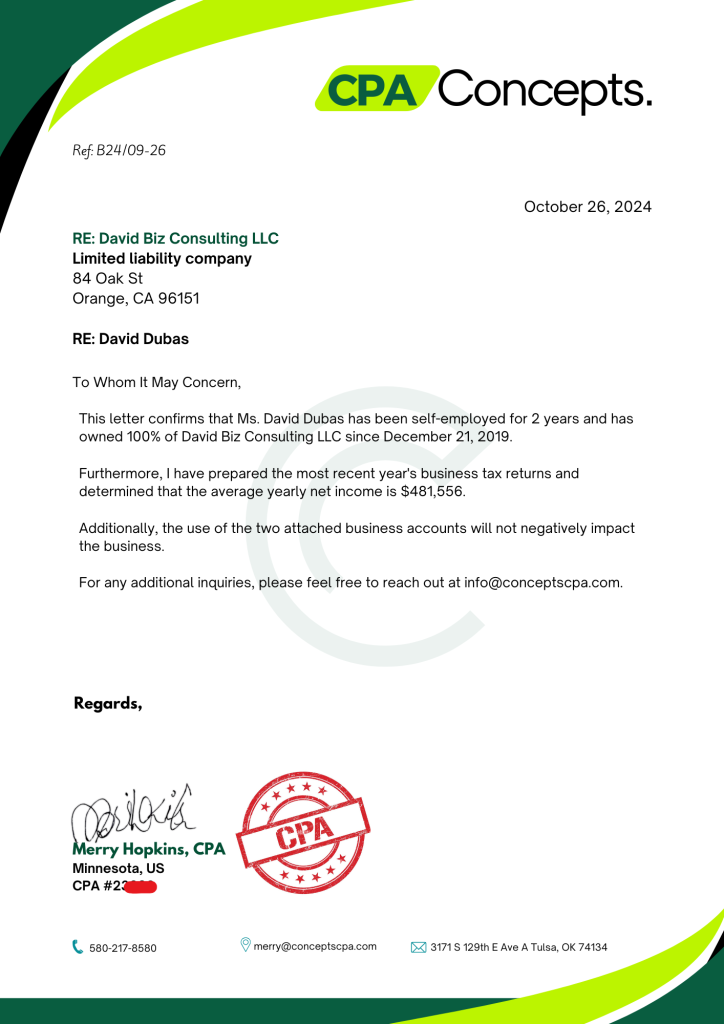CPA Letter for Mortgage
Our CPA Letter for Mortgage provides an official confirmation of your financial health, giving lenders the confidence to approve your mortgage application with assurance of your stability and reliability.
$295
- Licensed CPA letter for Expense Ratio
- Certified by a tax authority
- Approved by all over US Lenders
- Unlimited Revisions untill approval
- 2 Hours Express Delivery
- 99% lender approval rate as of Today
- Verification to lenders, Tenant, Bank Officers
- Used for any legal, loan, Financial purposes with 100% Acceptance Rate

CPA Letter for Mortgage
$295
- Licensed CPA letter for Expense Ratio
- Certified by a tax authority
- Approved by all over US Lenders
- Unlimited Revisions untill approval
- 2 Hours Express Delivery
- 99% lender approval rate as of Today
- Verification to lenders, Tenant, Bank Officers
- Used for any legal, loan, Financial purposes with 100% Acceptance Rate
CPA Letter for Mortgage
Buying a home can feel like navigating a maze. One of the hurdles you might encounter, especially if you’re self-employed or running a business, is providing proof of income. This is where aCPA letter for mortgage comes in. It might sound complicated, but it’s really just a document that gives lenders the confidence they need to approve your mortgage. Let’s break it all down.
Sample CPA Letter for Mortgage
This sample can serve as a guide to help self-employed individuals understand what to expect in a professionally drafted CPA letter. Customize the template as needed to match specific lender requirements or unique financial situations.
Ready to request your CPA letter? Contact us to begin the process today!
What is a CPA Letter for Mortgage?
A CPA letter for mortgage is a formal document prepared by a certified public accountant (CPA) that verifies your income and business activities. Lenders often require this when traditional proof, like pay stubs, isn’t available, especially for self-employed individuals or small business owners. The CPA’s signature carries weight, making it a valuable part of your mortgage application.
Why Lenders Ask for a CPA Letter
Lenders request CPA letters to confirm your financial health and stability. Traditional employees provide pay stubs and W-2s, but if you’re self-employed, proving income can be trickier. A CPA letter steps in to show lenders you have a steady and reliable source of income, even if it’s not in a traditional form.
How Does a CPA Letter Help Secure a Mortgage?
Verification of Income for Self-Employed Borrowers
Being self-employed means your income might not be as straightforward as a regular paycheck. A CPA letter provides detailed income verification, proving to lenders that you’re financially capable of handling mortgage payments. The letter outlines your business revenue, profits, and sometimes even projected income.
Proof of Financial Stability
Lenders want to see that you’re financially stable, and a CPA letter can highlight your consistent earnings and stable financial footing. It gives them confidence that you won’t default on the loan due to unstable income.
Boosts Your Credibility with Lenders
Think of the CPA letter as a badge of trust. When a CPA vouches for your financial health, it boosts your credibility. Lenders trust that the numbers presented are accurate and trustworthy, giving you a leg up in securing that home loan.
Key Components of a CPA Letter for Mortgage
Income and Profit Verification
The core of a CPA letter is income verification. It includes details about your business income, often spanning several years to show consistent earnings. It may also mention profit margins, giving a clearer picture of how well your business performs.
Tax Information and Financial Statements
The CPA letter often references your tax returns, summarizing key details like gross income, deductions, and net profit. Some letters even include an attached summary of your business’s financial statements, offering more transparency to the lender.
Certification of Business Ownership
For self-employed individuals, proving that you own your business is crucial. A CPA letter can also certify your ownership, verifying that the income generated comes from a business you control.
When Do You Need a CPA Letter for a Mortgage?
Common Scenarios for Self-Employed Individuals
If you’re self-employed, especially in industries with fluctuating income like freelancing or consulting, a CPA letter can help smooth the mortgage process. It reassures lenders that despite variable income, you’re financially stable.
Cases Where Income Varies from Year to Year
Even if you have a steady job, some people experience significant shifts in income from year to year. A CPA letter helps clarify why these changes occurred and how they affect your ability to repay a mortgage.
How to Request a CPA Letter for Your Mortgage Application
What Information Should You Provide to Your CPA?
When requesting a CPA letter, give your accountant the details they need to create a thorough document. This includes income information, tax returns, and other financial documents. Clear communication ensures the letter covers all the necessary points.
Steps in Writing and Submitting the CPA Letter
Once your CPA has all the information, they’ll write the letter. It’s then your responsibility to submit it to the lender, ensuring that it arrives alongside other required documents like your mortgage application.
Common Misconceptions About CPA Letters for Mortgage
CPA Letters Guarantee Loan Approval
A CPA letter can significantly improve your chances, but it’s not a golden ticket. Other factors—like your credit score and down payment—still play crucial roles in the approval process.
Any CPA Can Write a Mortgage Letter
Not every CPA is equipped to write a detailed mortgage letter. You need a CPA who understands the nuances of your business and income, so they can provide accurate and meaningful verification.
Tips for Getting a Strong CPA Letter for Your Mortgage
Work with an Experienced CPA
Choose a CPA who has experience working with mortgage letters. They’ll know exactly what lenders look for and how to frame your financial situation in the best light.
Ensure Accuracy and Transparency
It’s tempting to embellish your numbers, but honesty is key. Ensure that your CPA sticks to the facts, as inaccuracies could lead to delays—or worse, denial of your loan.
Alternatives to a CPA Letter for Mortgage Approval
Bank Statements and Tax Returns
If a CPA letter isn’t available or suitable, bank statements and tax returns can also be used to verify income. Lenders typically require at least two years’ worth of documents to assess financial stability.
Profit and Loss Statements
Another option is to submit a profit and loss statement, prepared by your CPA or generated through accounting software. This gives a snapshot of your business’s financial performance over a specific period.
Conclusion
In the complex world of mortgage applications, aCPA letter can be your secret weapon, especially if you’re self-employed or have non-traditional income. It’s more than just a piece of paper—it’s proof of your financial reliability and stability. By working with an experienced CPA and providing accurate details, you can boost your chances of securing the mortgage you need to buy your dream home.
What information should be included in a CPA letter for a mortgage?
A CPA letter should include details about your income, financial statements, business ownership, and tax information.
How long does it take to get a CPA letter for a mortgage?
It usually takes a few days to a week, depending on your CPA’s availability and the complexity of your finances.
Can I use a CPA letter if my income varies from year to year?
Yes, a CPA letter can explain fluctuations in income, helping lenders understand your financial situation better.
Is a CPA letter mandatory for self-employed mortgage applicants?
While not always mandatory, many lenders require a CPA letter to verify income for self-employed individuals.
Can a CPA letter replace tax returns?
No, a CPA letter is a supplement, not a replacement for tax returns or other financial documentation.


